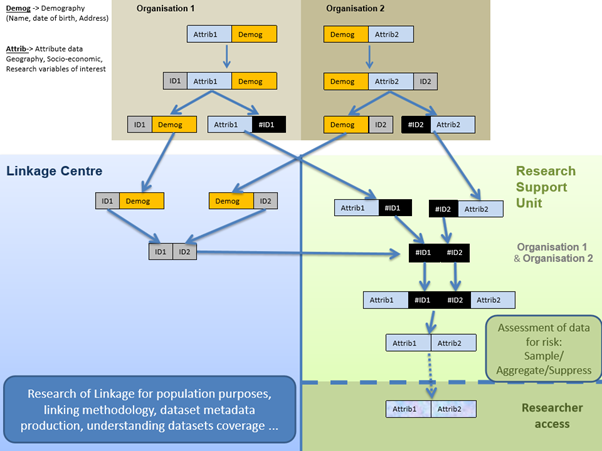What is the role of the Trusted Third Party?
The Administrative Data Research Northern Ireland (ADR NI) brings together Queen’s University Belfast, Ulster University, and the Northern Ireland Statistics and Research Agency (NISRA). ADR NI makes it possible for trained researchers to use administrative data for social and economic research, whilst making sure the data remain safe and the privacy of individuals is protected.
The Information Commissioner Office’s Anonymisation Code of Practice highlights conditions for processing personal data for research. The use of an independent NISRA-led Trusted Third Party (TTP) for ADR NI projects, as recommended in the ICO guidance, fulfils a vital role in ensuring the privacy of research subjects. The TTP only receives limited personal information (e.g. name, date of birth and address) from which it creates an anonymous index that matches the IDs of the other datasets.
This index is then used by the data custodians and the independent Research Support Unit (RSU) team in NISRA to bring together de-identified datasets to produce an overall research dataset. The two teams in NISRA (TTP and RSU) are managed and run separately under separate Senior Civil Service direction to ensure that the TTP and RSU processes are independent.
How are Datasets Linked?
The objective of any data matching exercise is to join data together, based on distinct identifiers for common entities between the data. Ideally, the use of a common unique identifier across all systems would simplify the data linkage process. Most administrative data systems do not have common unique identifiers and therefore records must be matched based on the available information (usually name, address and date of birth).
An exact match can be created when the details for an individual are identical in both systems. However, there are many reasons why the records for an individual, on different sources, may not be exactly the same. Information such as names and dates of birth may be incorrect or held inaccurately in one or both sources, and alternatives such as: middle names in place of forenames; or aliases in place of forenames may be present. The method of collection, purpose of the data, and the amount of verification applied before the data is entered onto the systems invariably mean that the records will not be identical on all systems. It is therefore important to ensure that any matching methodology takes account of non-exact matched records.
To facilitate these requirements, a ‘rule based’ or deterministic data matching approach, referred to as Match-Keys, is used. Match-keys are created by putting together pieces of information to create unique keys that can be used for automated matching. Further detail on this matching can be found in Trusted Third Party ADR NI matching methodology.
The Linkage Diagram (Figure 1) illustrates how the linkage keys are generated by the TTP Linkage Service. The linkage keys are created for each project and deleted from the TTP network as soon as these have been successfully passed over to RSU.

Figure 1: This is a diagrammatical representation of the steps by which data from two separate organisations within Northern Ireland are safely and securely linked by the trusted third party.
Types of Projects TTP Completes
ADR NI research projects involve the linkage of data from a number of departments (including DAERA, DoF, DoE, DfC, DfE and DoJ). Various ADR NI projects that TTP have facilitated are included within the ADR website Publications and Reports. NISRA RSU have also developed a suite of themed datasets available for use by accredited researchers through the ADR NI. TTP have provided the linkage facility for any of these projects requiring data from different sources to be linked, such as the Earnings and Employees Study (EES) 2011 with TTP EES Linkage Report and TTP Data Quality Report made available for researchers online.
NISRA TTP also carry out the necessary linkage role for the upkeep of the Northern Ireland Longitudinal Study (NILS) and the Northern Ireland Mortality Study (NIMS). Both of which are research resources available through RSU.
A Distinct Linkage Project (DLP) involves linking Health and Social Care (HSC) data to the Northern Ireland Longitudinal Study (NILS). This includes Primary health care data (supplied by the Business Services Organisation) and secondary health care data available through the HSC Regional Data Warehouse (via the Honest Broker Service). NISRA TTP enable the linkage between the HSC data and NILS. These projects are applied for and managed through NISRA RSU.
The time required for a data linkage project varies depending on a variety of factors such as:
- the number of data sources involved
- the quality and completeness of the data
- whether the data has been utilised for a previous linkage project
The role of TTP in the development of a linked research dataset is part of a wider task requiring: project accreditation; researcher accreditation; legal governance through a Data Sharing Agreement (or similar); data linkage; statistical disclosure control assessment; and creation of de-identified research dataset. As such, RSU should be consulted for guideline timings for the development of research projects.
If wishing to pursue a project through the NILS/NIMS or ADR NI, researchers should contact RSU in the first instance.
Please note: if there is anything within these webpages that you do not find accurate or complete, please contact TTP at the following address, or the UK Statistics Authority can also be contacted.
Contact Information:
TTP : census@nisra.gov.uk
RSU : rsu@nisra.gov.uk
UKSA Research Accreditation Panel : Research.Accreditation@statistics.gov.uk